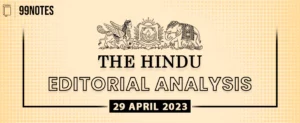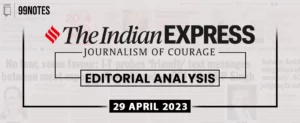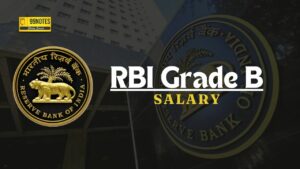30 April 2024 : PIB Summary for UPSC
PIB Summary for UPSC
30-April-2024
1. Mines Ministry Inks MoU with Shakti Sustainable Energy Foundation for Providing Knowledge Support in the Field of Critical Minerals
| Topic: GS2 – Governance, GS3 – Indian Economy
Understanding critical minerals is crucial for India’s economic growth, national security, and low-carbon energy transition, relevant for UPSC exams. |
| Context: |
| ● The news pertains to the inauguration of the ‘Critical Minerals Summit’ in New Delhi, focusing on enhancing beneficiation and processing capabilities, with an emphasis on India’s mineral exploration and production. |
Analysis of the news:
- The ‘Critical Minerals Summit: Enhancing Beneficiation and Processing Capabilities’ began at the India Habitat Centre, New Delhi.
- The summit aims to promote collaboration and innovation in critical minerals beneficiation and processing.
- It was inaugurated under the Ministry of Mines’ patronage, with a government official overseeing the opening ceremony.
- Exhibition pavilions showcased diverse minerals from terrestrial and marine environments.
- India’s urgent need for robust exploration and utilisation of critical minerals was emphasised.
- Recent government initiatives, including mineral block auctions, were highlighted to accelerate domestic mineral exploration and production.
- A Memorandum of Understanding (MoU) was signed between the Ministry of Mines and Shakti Sustainable Energy Foundation.
- The MoU aims to initiate a partnership focused on providing knowledge support in critical minerals for India’s economic development, national security, and low-carbon energy transition.
| Critical Minerals and their significance |
| What are Critical Minerals?
● Definition: Critical minerals are those minerals that are essential for economic development and national security, the lack of availability of these minerals or concentration of extraction or processing in a few geographical locations may lead to supply chain vulnerabilities and even disruption of supplies. (Source – Ministry Of Mines Website) ● Essential Components: Critical minerals are natural resources that are vital for various industrial sectors, including technology, defence, energy, and healthcare. ● High Economic Value: These minerals possess unique properties and play a crucial role in the manufacturing of advanced technologies and products. ● Limited Availability: Critical minerals are characterised by limited global reserves and concentrated production in a few countries. ● Strategic Importance: They are essential for national security, economic competitiveness, and sustainable development. ● Diverse Applications: Critical minerals are used in diverse applications such as electronics, renewable energy, aerospace, and healthcare industries. Significance for Indian Economy: ● Industrial Growth: Access to critical minerals promotes industrial growth, innovation, and technological advancement, driving economic development. ● Reduced Import Dependency: Domestic availability of critical minerals reduces import dependency, enhances supply chain resilience, and strengthens economic sovereignty. ● Strategic Advantage: Securing a stable supply of critical minerals provides India with a strategic advantage in key sectors and reduces vulnerability to global market fluctuations. ● Job Creation: Development of critical mineral reserves generates employment opportunities, fosters entrepreneurship, and stimulates economic activity in mining and related industries. ● Energy Security: Critical minerals are essential for the development of clean energy technologies, contributing to India’s energy security and transition to a sustainable and low-carbon economy. |
| Practice Question: How do critical minerals contribute to a nation’s economic growth, national security, and energy transition? Discuss with reference to India’s initiatives and challenges. (150 Words /10 marks) |
2. Vice President echoes CJI on arbitration becoming an “Old Boys Club”, calls for urgent reforms in dispute resolution mechanism
| Topic: GS2 – Governance, GS2 – Indian Polity – Judiciary
Understanding arbitration reform is crucial for India’s legal system evolution and its aspiration to become a global arbitration hub. |
| Context: |
| ● The Vice-President calls for reform in India’s arbitration system, emphasizing harmony in the process and expressing India’s potential as a global arbitration hub. |
Analysis of the news:
- Vice-President Jagdeep Dhankhar emphasises the need for reform in the Indian arbitration system, echoing concerns raised by Chief Justice Chandrachud.
- He criticises the current state of arbitration, likening it to an “Old Boys’ Club” controlled by former judges.
- Dhankhar calls for systemic change, highlighting the strength of institutions in fostering meaningful reform.
- He describes the Indian arbitration process as arduous and overly complex, disapproving its use as an additional tier in conventional litigation.
- The Vice-President urges industry, legal fraternity, and stakeholders to work together for effective dispute resolution.
- Dhankhar expresses India’s potential to become a global arbitration hub, citing the need for adherence to the country’s legal regime.
- He mentions recent laws that have reformed the Indian criminal justice system, focusing on justice rather than punishment.
- Highlighting the critical importance of dispute resolution mechanisms, Dhankhar stresses the need for harmony and contribution to economic and democratic values.
| Alternative Dispute Redressal (ADR) Mechanisms |
| What Are Alternative Dispute Redressal (ADR) Mechanisms?:
● Definition: ADR refers to methods of resolving disputes outside of traditional court litigation, providing parties with a more flexible, cost-effective, and expedient means of resolving conflicts. Types of ADR: ● Mediation: Involves a neutral third party facilitating negotiations between disputing parties to reach a mutually acceptable agreement. ● Arbitration: Involves a neutral arbitrator or panel making a binding decision on the dispute after hearing arguments and evidence from both sides. ● Conciliation: Similar to mediation but with a more active role for the conciliator in proposing solutions and assisting parties in reaching a settlement. ● Negotiation: Direct communication between parties to reach a settlement without third-party involvement. Significance of ADR: ● Time and Cost Efficiency: ADR processes are generally faster and less expensive than traditional litigation, saving time and resources for all parties involved. ● Preservation of Relationships: ADR allows parties to maintain control over the resolution process, preserving relationships and enabling creative solutions. ● Privacy and Confidentiality: ADR proceedings offer confidentiality, protecting sensitive information from public disclosure. ● Flexibility and Informality: ADR methods provide flexibility and informality, allowing parties to tailor the process to their specific needs and preferences. Challenges Associated with ADR: ● Enforcement of Decisions: Ensuring compliance with ADR decisions can be challenging, especially in jurisdictions where enforcement mechanisms are weak. ● Unequal Bargaining Power: Disparities in bargaining power between parties can undermine the fairness and effectiveness of ADR processes. ● Lack of Expertise: ADR practitioners may lack the necessary expertise or qualifications to effectively resolve complex disputes. ● Limited Accessibility: ADR mechanisms may not be readily accessible to all individuals or communities, particularly those in remote or marginalised areas. ● Resistance to Change: Some parties may be resistant to using ADR due to unfamiliarity or distrust of alternative dispute resolution methods, preferring traditional litigation. |
| PYQ: What are the major changes brought in the Arbitration and Conciliation Act, 1996 through the recent Ordinance promulgated by the President? How far will it improve India’s dispute resolution mechanism? Discuss. (200 words/12.5m) (UPSC CSE (M) GS-2 2015) |
| Practice Question: Discuss the significance of arbitration reform in India and its role in establishing the country as a global arbitration hub. (250 Words /15 marks) |
For Enquiry

30 April 2024 : PIB Summary for UPSC Copy

30 April 2024 : The Hindu Editorial Notes PDF Copy

30 April 2024 : Indian Express Editorial Analysis

RBI Grade B Salary- In Hand Salary, Grade Pay, Job Profile, Perks & Allowances

29 April 2024 : Daily Current Affairs Quiz

29 April 2024 : Daily Answer Writing

29 April 2024 : PIB Summary for UPSC

29 April 2024 : Daily Current Affairs

29 April 2024 : The Hindu Editorial Notes PDF

29 April 2024 : Indian Express Editorial Analysis
April 2024 PIB 30 April 2024 : PIB Summary for UPSC Copy PIB Summary for UPSC
30-April-2024
1. Mines Ministry Inks MoU with Shakti Sustainable Energy Foundation…
April 2024 The Hindu Editorial 30 April 2024 : The Hindu Editorial Notes PDF Copy The Hindu EDITORIAL
30-April-2024
1. Court’s nudge on hospital charges, a reform opportunity
Topic:…
April 2024 Indian Express 30 April 2024 : Indian Express Editorial Analysis Indian Express Editorial Analysis
30-April-2024
1. Mind the gap
Topic: GS2 – Governance – Government…
Blogs Upsc RBI Grade B Salary- In Hand Salary, Grade Pay, Job Profile, Perks & Allowances RBI Grade B Salary- The starting salary of an RBI Grade B officer in India ranges from around INR 68,410…
Daily Quiz 29 April 2024 : Daily Current Affairs Quiz 29- April 2024 : Daily Quiz…
mains answer writing 29 April 2024 : Daily Answer Writing Mains Answer Writing
29-April-2024
Q1) Why are TOP (tomato, onion, potato) crops susceptible to large…
April 2024 PIB 29 April 2024 : PIB Summary for UPSC PIB Summary for UPSC
29-April-2024
1. Mines Ministry to Hold Two-day Critical Minerals Summit from Tomorrow
Topic:…
April 2024 Daily Current Affairs 29 April 2024 : Daily Current Affairs Daily Current Affairs
29-April -2024- Top News of the Day
1. India’s imports from China rise to $101…
April 2024 The Hindu Editorial 29 April 2024 : The Hindu Editorial Notes PDF The Hindu EDITORIAL
29-April-2024
1. Inequality can no longer be ignored
Topic: GS2 – Social Justice,…
April 2024 Indian Express 29 April 2024 : Indian Express Editorial Analysis Indian Express Editorial Analysis
29-April-2024
1. FOR FUTURE READY SENIORS
Topic: GS2 – Social Justice…




